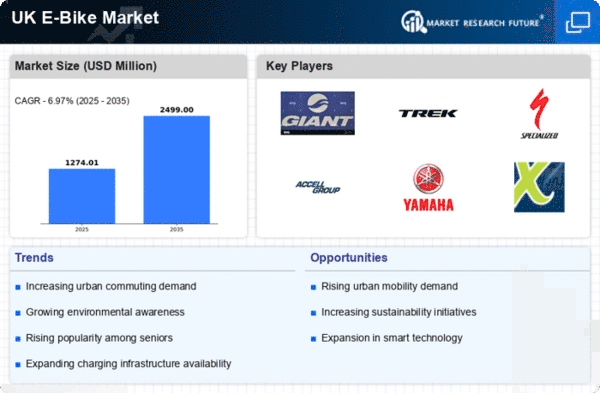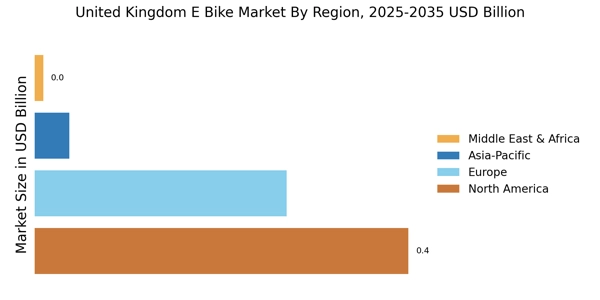Rising Fuel Prices
The e bike market in the UK is also being influenced by rising fuel prices, which have prompted consumers to seek more economical transportation alternatives. As petrol and diesel prices continue to climb, the cost-effectiveness of e bikes becomes increasingly appealing. In 2025, average fuel prices reached £1.50 per litre, leading to a surge in e bike sales as individuals look to reduce their commuting expenses. This economic pressure is likely to drive more consumers towards the e bike market, as e bikes offer lower operational costs compared to traditional vehicles. Consequently, the market may see a significant uptick in sales as consumers prioritize affordability in their transportation choices.
Health and Fitness Awareness
Growing health and fitness awareness among the UK population is driving the e bike market. As individuals increasingly prioritize physical well-being, e bikes are perceived as an attractive option that combines exercise with convenience. The e bike market benefits from this trend, as many consumers view e biking as a way to incorporate physical activity into their daily routines without the strain of traditional cycling. Recent surveys indicate that 30% of e bike users cite health benefits as a primary reason for their purchase. This shift in consumer mindset is likely to propel the e bike market forward, as more individuals seek to balance their health goals with practical transportation solutions.
Urban Infrastructure Development
The ongoing development of urban infrastructure in the UK is significantly impacting the e bike market. Cities are increasingly investing in dedicated cycling lanes and bike-sharing programs, which enhance the safety and convenience of using e bikes. According to recent data, urban areas that have implemented extensive cycling infrastructure have witnessed a 20% increase in e bike usage. This trend suggests that as cities become more bike-friendly, the e bike market will likely expand, attracting a broader demographic of users. Furthermore, improved infrastructure not only encourages existing cyclists to switch to e bikes but also entices new riders, thereby fostering a culture of cycling as a primary mode of transport.
Government Incentives and Subsidies
The e bike market in the UK is experiencing a notable boost due to government incentives and subsidies aimed at promoting sustainable transportation. Initiatives such as grants for e bike purchases and tax reductions for manufacturers are encouraging consumers to consider e bikes as a viable alternative to traditional vehicles. In 2025, the UK government allocated £2 million to support e bike initiatives, which is expected to increase market penetration by approximately 15%. These financial incentives not only lower the initial cost for consumers but also stimulate the e bike market by fostering innovation and competition among manufacturers. As a result, the e bike market is likely to see a surge in sales, contributing to a more environmentally friendly transportation landscape.
Technological Advancements in E Bikes
Technological advancements in e bikes are playing a crucial role in shaping the e bike market. Innovations such as improved battery life, lightweight materials, and smart connectivity features are enhancing the overall user experience. In 2025, the introduction of e bikes with battery ranges exceeding 100 km on a single charge has attracted a wider audience, including those who previously viewed e bikes as impractical. The e bike market is likely to benefit from these advancements, as they not only improve performance but also appeal to tech-savvy consumers. As manufacturers continue to invest in research and development, the e bike market is expected to evolve, offering more sophisticated and efficient models that cater to diverse consumer needs.

















